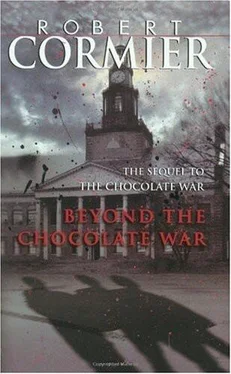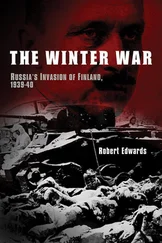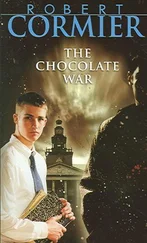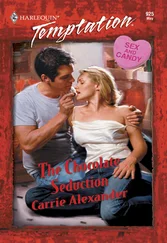All of which was evading the question, of course.
What question?
The question of the Goober and why he'd acted so stupidly when the Goober visited him.
I should have stayed in Canada, he thought, turning from the window. I shouldn't have come back.
After those bruised weeks of pain and desolation in the Boston hospital, he had accepted without protest or any emotion at all his father's decision to send him to Canada, to spend a few months with his uncle Octave and aunt Olivine. They lived in the small parish of St. Antoine on the banks of the Riviere Richelieu, where his mother had lived as a child. His small Canadian world had three focal points: the modest farm operated by his uncle and aunt; the village, which consisted of a few stores, a post office, and a Sunoco service station; and the ancient church, a small white frame building overlooking the aimless river. He spent a lot of time in the church, although he found it spooky at first, creaky, buffeted by stiff river winds. The winds breathed life into the old building, made the floors squeak, the walls buckle, the windows rattle. He didn't pray; not at first, anyway. Merely sat there. The winter had been mild by Canadian standards but the wind was relentless, blowing away the snow that fell almost every day. The church was a good resting place after his daily walk from the farm to the village. He picked up a few groceries, checked the post office for mail (his father wrote at least once a week, brief, keep-in-touch letters that said nothing, really), and began to look forward to the church visits.
The wind made the church talk. The Talking Church. The small hum of the boiler addressing the hiss of the steam pipes. The walls and windows chattering to each other, and the creaking floor contributing to the conversation. He smiled as he listened to the small whispering, chatting sounds. His first smile in ages. As if the church had induced his smile. After a while he knelt and prayed, the old French prayers his mother had taught him long ago—" Notre Pиre "; " Je Vous Salue, Marie " — the words meaningless but comforting somehow, as if he and the church had joined each other in a kind of companionship.
His aunt and uncle treated him with gruff tenderness and affection. A childless couple, farmers, at the constant mercy of the elements, they were patient, quiet people. His uncle's only vice was television, and he watched it continuously when he wasn't out in the fields or the barn, marveling at the succession of programs on the glowing tube, uncritical, amused, whether watching a soap opera in French or a hockey game with his beloved Canadiens from Montreal. His aunt was a small peppy woman whose hands were never empty and fingers never still as she knitted, crocheted, sewed, cooked, dusted, swept, bustled around the modest house. She did all this in silence. The television provided the soundtrack to their lives.
Jerry spoke a bit of French, enough to get by, but he too enjoyed the absence of conversation, learned to accept the sounds of television. He immersed himself in the daily routine of chores, going to the village and the church, reading late at night, blocking from his mind all thoughts of Monument and Trinity, as if by some magic he was able to turn his mind into a blank screen at will.
More and more drawn to the church, he found comfort there, despite the chilled atmosphere. He had read somewhere of contemplatives, priests or brothers or monks, who spent their days and nights in solitude, praying, musing, contemplating, and Jerry could understand the peace these men must attain. The afternoon sun would lose its warmth, the church growing colder, the pipes rattling, and Jerry would shiver himself back to the warmth of the farmhouse.
So the winter passed, a succession of peaceful days and evenings, Monument and Trinity existing in another world, another time, having nothing to do with him. Until his father telephoned to say it was time to come home. "I miss you, Jerry," he said. And Jerry felt tears stinging his eyes. I miss you, Jerry . Although he was reluctant to leave the peace and serenity of St. Antoine, he felt a leap of gladness at his father's words.
Once back in Monument, however, he longed to return to Canada, to see the spring season bursting in the fields, wondering what kind of conversation the church would be carrying on with the windows open to the outside world. But knew that was impossible. He had to resume his life here in Monument. Enter Monument High in the fall. Live according to the rules he had established for himself after the chocolate sale. Don't make waves, go with the flow. Pretend the world wore a sign like the kind hanging on doorknobs in motels: DO NOT DISTURB. But the Goober's visit had upset his balance, taking him by surprise.
"I really acted stupid this afternoon. Right, Dad?" he had asked as they sat at the supper table that evening.
"I wouldn't say stupid," his father replied. "Besides, it was my fault. I didn't realize you weren't ready for that kind of thing. . "
"But I should be. And I should tell the Goober that he didn't double-cross me last year. Cripes, he acts like he was a traitor or something. And he wasn't."
Silence in the dining room. Their lives were filled with silences, but not the comfortable land that existed in the farmhouse in St. Antoine. Because his father was quiet and reserved by nature, they had never talked at length, communicated mostly in brief conversations with many stumblings. The death of Jerry's mother a year before had stunned them into a deeper silence, his father moving as in a trance through his days and evenings while Jerry had been immersed in his own troubles. Entering Trinity. Football and making the freshman team. The chocolate sale. And everything that followed. Which Canada had helped him forget. Until the Goober showed up.
"I should call him, right?" Jerry asked.
"Not if it hurts you, son. You're the important one. The Goober can always wait. . "
Again the silence. In the silence, Jerry was grateful for his father's words. Let the Goober wait. He felt bad for his old friend, but he had to make certain that he himself was back to normal again, restored and repaired, before he worried about others.
And yet. And yet.
Later, after his father had gone to work, Jerry found himself at the telephone, looking at the phone book under the instrument. Could almost recall the Goober's number, not certain of the last digit—6 or 7? Reached for the telephone book but, finally, didn't pick it up. Some other time.
He went to the window, glanced out at the dark street, and withdrew into the room. He knew that he had to get out of this apartment, pick up the pieces of his life. Walk the streets, drop in at the library, check the record store, breathe some spring air into his lungs. And call the Goober.
Maybe tomorrow.
Or the next day.
Or never.
Tubs Casper had sworn off girls forever. But the result of that decision was agonizing. He hadn't realized it would be this way when he broke up with Rita, said good-bye forever, stalked off in anger and desperation and, yes, pain. Jeez, what pain. Pain in his heart and in his groin. He felt wounded, as if he'd been through a war in the trenches like the soldiers in World War I — the War to Make the World Safe for Democracy, they had called it in Social Science — trudging through his days and nights like the walking wounded, trying to keep himself from feeling anything, which was impossible, of course. Worst of all, he was eating like a madman and had gained nine pounds, which meant he was now forty-five pounds overweight. Found it hard to breathe going up the stairs, sweated all the time, perpetually moist, oozing. And on top of all that, the Vigils.
He was bubbling with sweat now as he stood in the small storage room in the gym. He had to blink to get rid of the perspiration gathering in his eyes. He knew that he looked as if he was crying. But he wasn't. He didn't want anybody to think he was a weeper. Underneath this terrible felt that he couldn't get rid of or disguise, he was brave and strong and durable. As he stood before the members of the Vigils, he was determined to put up a good front, despite the fat and the sweat. He recognized some of the guys who sat in the room's dimness, knew their names but had never talked to any of them. Freshmen like Tubs kept out of the way of upperclassmen. He looked around for the kid called Obie but did not see him here. Obie was the only Vigil member he had talked with, and he preferred not to think about their association, because it had to do with Rita and the chocolates.
Читать дальше











